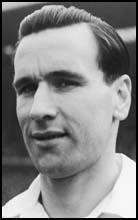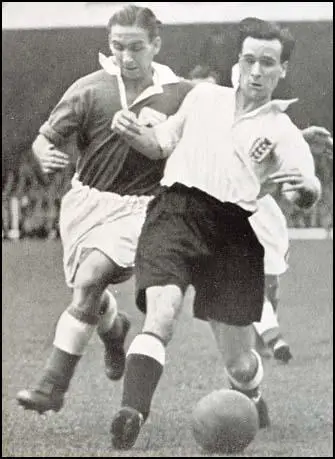Neil Franklin

Cornelius (Neil) Franklin was born in Shelton on 24th January, 1922. A talented centre-half, Franklin joined Stoke City in January 1939. The team included players such as Stanley Matthews and Freddie Steele.
Franklin's career was interrupted by the Second World War. He joined the Royal Air Force but as he was based in Blackpool he was able to continue to play football and made 186 appearances for Stoke City in friendly and regional fixtures as well as representing England in 10 wartime internationals.
Franklin was made captain of Stoke City in the 1946-47 season. After the war stories circulated that Stanley Matthews was dropped from the team by Bob McGrory and replaced by George Mountford because he was "unpopular" in the dressing-room. As his friend, Tom Finney, later explained: "Neil called a meeting of the players, sought their collective view, informed Stanley by letter of his intentions and strode off to see the board to quash the rumours and pay handsome tribute to his illustrious team-mate." Matthews later wrote: "The problem was not resolved, but knowing that I had the support of my team-mates, including George Mountford who had replaced me, made me feel a whole lot better about the whole sorry affair."
Franklin won his won his first international cap for England against Northern Ireland on 28th September, 1946. Franklin retained his place and that season played against Republic of Ireland (1-0), Wales (3-0), Holland (8-2), Scotland (1-1), France (3-0), Switzerland (0-1) and Portugal (10-0). The England team that season included players such as Raich Carter, Tommy Lawton, Wilf Mannion, Harry Johnston, George Hardwick, Laurie Scott, Tom Finney, Stanley Matthews, Stan Mortensen, Billy Wright and Frank Swift.
Stoke City challenged for the First Division league title in the 1946-47 season. However, after Stanley Matthews moved to Blackpool in May 1947 the club went into decline.
Franklin retained his place in the England team and in the 1947-48 season he played against Belgium (5-2), Wales (3-0), Northern Ireland (2-2), Sweden (4-2), Scotland (2-0) and Italy (4-0). Franklin was now considered to be one of the best centre-halves in the world. Wilf Mannion, who played with Franklin for England, wrote that he was a confident tackler and a master header of the ball.
In his autobiography Stanley Matthews argued: "Neil won everything in the air, tackled with superb timing and when the ball was at his feet possessed the nous to pass it will all the guile and intelligence of the most cerebral of inside-forwards. An erect physique belied tremendous mobility and breathtaking speed over four or five yards." Tom Finney agreed and claimed that Franklin was the "best defender I ever played with or against".

Franklin, like all top professionals at the time, earned £12 per week in the season and £10 per week in the summer. There was also a £2 win and £1 draw bonus, the £750 benefit every five years. He also received £20 every time he played for England. Other clubs would be unable to pay more because of the maximum wage rule. If he managed to get a transfer to another club he would only be paid a £10 signing on fee. However, while on international duty he heard that some clubs offered illegal cash inducements and jobs that did not really exist as an attempt to fool the authorities.
Other legal methods of persuading players to join or stay with a club included setting them up in a business or finding them lucrative part-time jobs. Stoke City did not do any of these things and Franklin wanted to go to another club that did. At the start of the 1948-49 season Franklin asked for a transfer. The club refused and Franklin was forced to stay at Stoke.
Wilf Mannion of Middlesbrough also wanted a transfer and when it was refused he went on strike. Jimmy Guthrie, chairman of the Players' Union, added his support of Mannion: "The transfer system as it is at present was evolved in the days of Alf Common. It just will not do today. We want a free market and none of this present restriction." After losing £400 in wages Mannion was eventually forced back to work.
Neil Franklin played against Denmark (0-0), Northern Ireland (6-2), Wales (1-0), Switzerland (6-0), Scotland (1-3), Sweden (1-3), Norway (4-1) and France (3-1) in the 1948-49 season.
Franklin told his friend Tom Finney: "You know, Tom, we are at the top of the tree and clubs are taking fortunes off people who want to see us play. We should be getting more of that money. It's a scandal."
On 15th April 1950, Franklin played in his 27th international game against Scotland. England won the game 1-0. A few days later Franklin announced that he was leaving Stoke City to play for the Independiente Santa Fe club in Colombia. Rumours began to circulate that Franklin and his club colleague, George Mountford, had been promised down payments of around £3,400 each plus £170 per match, plus free accommodation.
As his friend Stanley Matthews later pointed out: "At first all went well, but Santa Fe were never forthcoming with the money they had promised. The country was very unstable politically and at 6.30 p.m. street curfew fueled anxieties. Neil returned to England after two months having received only one week's wages and no signing-on fee." He only played in six games while in Colombia.
Franklin was banned from playing in Britain by the Football League and the Football Association and he was unable to play for Stoke City or England. The ban was eventually lifted and in February 1951 he was sold to Second Division club Hull City for £22,500, at the time a world record fee for a defender.
Franklin suffered a serious knee injury and missed the second-half of the 1951-52 season. Another injury meant that he hardly played in any games in the 1952-53 season. He never fully recovered from this knee injury and unable to command a regular place in the team he moved to Crewe Alexandra in February 1956. This was followed by brief spells at Stockport County and Mansfield Town.
Franklin retired from playing football in 1957. He did manage several non-league clubs before joining Third Division side Colchester United in 1962. This was not a success and he later ran a pub called the Dog and Doublet in Sandon, Staffordshire.
Neil Franklin died on 9th February, 1996.
Primary Sources
(1) Stan Mortensen, Football is My Game (1949)
Neil Franklin is my ideal centre-half. Of course he plays as a stopper, in the modern fashion, but he also uses the ball cleverly. Note, for instance, how he uses the pass-back to the goalkeeper. I have already told you how Frank Swift developed the trick of starting attacks from his own goal-line, and with Neil he built up a set of sequence moves. Neil would check a raid, hold the ball long enough to ensure complete control of both ball and his immediate surroundings, noting the placing of every opponent, and then if all was clear, slip the ball back.
Against Scotland at Hampden Park in April 1948, the first half was a bad time for the English team. We were not playing badly enough to get rattled, but we couldn't get the rhythm in our movements. So the Scots had us more or less on the run, yet they rarely got within shooting range of Frank, because Neil kept getting that ball and slipping it back for our goalkeeper to use.
It must have been galling to Scotland's supporters, as well as players to see this apparently simple move so often exploited to keep the home side at bay. Like all good things, it isn't as simple as it looks. To be able to carry out this play successfully the centre-half must have ball-control equal to that of an inside-forward.
Another way in which Neil appeals to his teammates is that he rarely gives a free kick away. The modern centre-half, trained to stop, is often penalised through being just clumsy, with arms flying as he goes into the tackle, not through any vicious intent. Neil, tidy and competent, always plays the ball, and so avoids giving away those dangerous free kicks on the fringe of the penalty area.
(2) Stanley Matthews, The Way It Was (2000)
The greatest centre-half I ever had the privilege of playing with, the incomparable Neil Franklin. At the time, Neil was widely considered to be the best centre-half in Britain. He had played in ten wartime and victory internationals for England and in this season went on to win the first of his 27 caps.
Neil won everything in the air, tackled with superb timing and when the ball was at his feet possessed the nous to pass it with all the guile and intelligence of the most cerebral of inside-forwards. An erect physique belied tremendous mobility and breathtaking speed over four or five yards. When it came to heading he was as dominant in the air as a Spitfire, and such was the timing of his tackling that when sliding in, his backside and tackling leg would touch the ground only momentarily before he rose majestically with the ball at his feet.
Many was the game played in pelting rain on a gluepot of a pitch when all the Stoke players would leave the field covered in mud except Neil whose shirt and shorts would be just specked with splashes. The only sign he had been in the thick of it would be the brown circle of mud hammered on to his forehead.
Neil oozed class and self-control in equal measures. When his legs were kicked from under him he would rise to his feet, look pityingly at the perpetrator of the shabby assault and with a gentle, disapproving shake of the head, turn and trot away to take up his position. He used his physical strength sparingly, preferring to rely on the skills he had been blessed with. In an era of bruising, granite-like centre-halves, he was a model of restraint.
